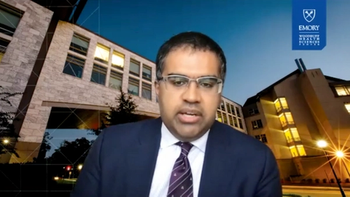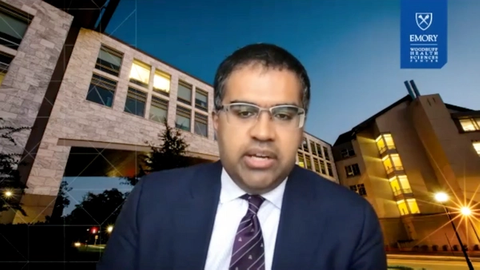
Bladder Cancer
Latest News
Latest Videos

CME Content
More News

The combination of eganelisib and nivolumab demonstrated promising activity and was well tolerated in a phase 2 trial of patients with advanced urothelial cancer.

The paper is meant to serve as a single source of information for helping patients with bladder cancer.

Combining the novel interleukin-15 superagonist complex N-803 (Anktiva) with BCG led to a high complete response rate in patients with BCG-unresponsive, high-risk, non-muscle invasive bladder cancer with carcinoma in situ.

Gomella looks back on the year's top headlines in bladder cancer, from FDA approvals to notable clinical trial results.

Dr. Vikram M. Narayan describes treatment advances and next steps in non-muscle invasive bladder cancer.

The PD-L1 inhibitor has been recommended for approval in this setting based on data from the phase 3 JAVELIN Bladder 100 study.

The phase 2 study has a targeted enrollment of 37 patients and a primary end point of complete response.

Experts in prostate cancer, bladder cancer, kidney stones, OAB/incontinence, BPH, and sexual dysfunction recap all the key advances from 2020.

“These data published in the Lancet Oncology show that nadofaragene firadenovec, a first-of-its-kind therapy, may be an effective treatment option for BCG-unresponsive non-muscle invasive bladder cancer patients,” Colin P. N. Dinney, MD.

Improvement in imaging modalities may help in performance of transurethral resection of the bladder tumor.

The new fixed-dose schedule is approved for all of durvalumab's FDA indications, including advanced bladder cancer.

UGN-102 (mitomycin) for intravesical solution induced long-lasting complete responses in patients with low-grade intermediate-risk non-muscle invasive bladder cancer.

Scott T. Tagawa, MD, highlighted pivotal data for enfortumab vedotin and sacituzumab govitecan at the 38th Annual CFS meeting.

“There is an urgent need for novel therapies in BCG-unresponsive disease. While standard cystectomy is highly curative, it is associated with a substantial risk for morbidity and non-trivial mortality,” said Arjun Balar MD.

In this interview, Seth P. Lerner, MD, discusses current recommendations for managing patients during the BCG shortage, what the FDA is doing to resolve the problem, and a SWOG trial testing a new strain of BCG.

In patients with muscle-invasive bladder cancer, gemcitabine plus once daily radiation showed a low cystectomy rate and high overall survival rate at long-term follow-up.

Stephen B. Williams, MD, MS, discusses a recent study evaluating costs of surgical treatments for bladder cancer.

Program encompasses patient counseling, anesthetic planning, and early mobilization.

Presurgical treatment with the PD-L1 inhibitor durvalumab and the CTLA-4 inhibitor tremelimumab showed promise in cisplatin-ineligible patients with high-risk localized bladder cancer.

The antibody-drug conjugate was highly active in patients who received a PD-1/PD-L1 inhibitor but were ineligible for cisplatin.

The sensitivity rate for the detection of urothelial carcinoma with the UroCAD urine-based liquid biopsy far exceeded the rate with urine cytology.

The OASIS trial is examining the capability of the RENOVA iStim implantable tibial neuromodulation system to reduce urinary urgency incontinence episodes.

"Currently, there is significant variability in the design, conduct, and analysis of clinical trials for adjuvant treatment of both kidney cancer and bladder cancer. This variability negatively affects our ability to interpret trial results," said Richard Pazdur, MD.

Dual immune checkpoint blockade with the PD-1 inhibitor tislelizumab and the PD-L1 inhibitor BGB-A333 showed clinical activity in bladder cancer.

The antibody-drug conjugate is used for the second-line treatment of patients with HER2-positive locally advanced or metastatic urothelial carcinoma.












